Fleurs du Mal Magazine


Or see the index
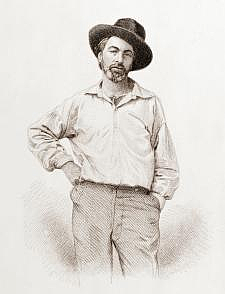
Beat! Beat! Drums!
Beat! beat! drums!–Blow! bugles! blow!
Through the windows–through doors–burst like a ruthless force,
Into the solemn church, and scatter the congregation;
Into the school where the scholar is studying;
Leave not the bridegroom quiet–no happiness must he have now with his bride;
Nor the peaceful farmer any peace, plowing his field or gathering his grain;
So fierce you whirr and pound, you drums–so shrill you bugles blow.
Beat! beat! drums!–Blow! bugles! blow!
Over the traffic of cities–over the rumble of wheels in the streets:
Are beds prepared for sleepers at night in the houses? No sleepers must sleep in those beds;
No bargainers’ bargains by day–no brokers or speculators–Would they continue?
Would the talkers be talking? would the singer attempt to sing?
Would the lawyer rise in the court to state his case before the judge?
Then rattle quicker, heavier drums–you bugles wilder blow.
Beat! beat! drums!–Blow! bugles! blow!
Make no parley–stop for no expostulation;
Mind not the timid–mind not the weeper or prayer;
Mind not the old man beseeching the young man;
Let not the child’s voice be heard, nor the mother’s entreaties;
Make even the trestles to shake the dead, where they lie awaiting the hearses,
So strong you thump, O terrible drums–so loud you bugles blow.
Walt Whitman
(1819 – 1892)
Poem: Beat! Beat! Drums!
• fleursdumal.nl magazine
More in: Archive W-X, Archive W-X, Whitman, Walt
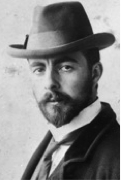
And Yet
They drew him from the darkened room,
Where, swooning in a peace profound,
Beneath a heavy fragrance drowned
Her grey form glimmered in the gloom.
Death smoothed from her each sordid trace
Of Life; at last he read the scroll;
For all the meaning of her soul
Flowered upon her perfect face.
“In other worlds her soul finds scope;
Her spirit lives; she is not dead,”
In his dulled ear they said and said,
Suave-murmuring the ancient Hope.
“You loved her; she was worthy love.
Think you her spheral soul can cease?
Nay, she has ripened to release
From this bare earth, and waits above.”
His brain their clamour heard aloof;
He, too, had said the self-same thing;
But now his heart was quivering
For more than comfort — parched for proof.
He put them from him. “Let me be;
You proffer in my bitter need
The coward comfort of a creed
That tears her soul apart from me.
“She waits in no drear Heaven afar.
Her woman’s soul in all its worth,
Yearning for me, for homely earth,
No gates of beaten gold could bar.
“No, she is near me, ever close;
One with the world, but free again;
One with the breezes and the rain;
One with the mountain and the rose.
“She knows me not; her voice is dumb;
But aching through the twilight peers,
And, unremembering, yet with tears,
She strives to say she cannot come.
“Yes, she is changed, but not destroyed;
The words that were her soul are hushed;
The gem that was her heart is crushed —
Its fragments white stars in the void.
“And I shall see her in disguise;
In the grey vistas of the street
A face that hints of her I meet;
Whispers her soul from alien eyes.
“In Time’s great garden, spring on spring,
The blossoms glow; then at a breath
Their petals flutter down to death —
Ah love, how brief your blossoming!
“Death has but severed part from part.
Borne on an ever-moving air
The fragrance of her life somewhere
Freshens some lonely wistful heart!
“No word of hers can God forget;
Her laughter Time dare not disperse;
It shakes the tense-strung universe,
And with the chord it trembles yet.
“Each mood of hers, each fancy slight,
In deep pulsations, ring on ring,
Dilating, ever-widening,
Ripples across the outer night.
“Her life with deathless charm was fraught,
And God with smiles remembers now
The puzzled pucker of her brow
Ruffled with sudden gusts of thought.
“And in His cosmic memory wise
Still live her subtle features thin,
Her dear iconoclastic chin,
The grave enigma of her eyes.
“And if beyond she might draw breath.
And know that I was not with her,
The wistful eyes of her despair
Would be more desolate than death.
“But not to meet her in the wide
Night-spaces I must wander through;
To kiss the pretty pout I knew,
And nevermore to hear her chide;
“To speak those childish words that were
So foolish-sweet, so passionate-wise;
Her subtle fragrance recognise
And hear the whispers of her hair! . . .
“Her sun has set; but still, sublime,
She is a star, of God a part;
She is a petal at the heart
Of the eternal flower of Time.
“I triumph so beyond regret,
I win her immortality:
Where, Death, your vaunted victory?
Where, Grave, your sting? And yet — and yet——!”
Arthur Adams
(1872-1936)
And Yet
• fleursdumal.nl magazine
More in: Adams, Arthur, Archive A-B, Archive A-B

When I Heard the Learn’d Astronomer
When I heard the learn’d astronomer;
When the proofs, the figures, were ranged in columns before me;
When I was shown the charts and the diagrams, to add, divide, and measure them;
When I, sitting, heard the astronomer, where he lectured with much applause in the lecture-room,
How soon, unaccountable, I became tired and sick;
Till rising and gliding out, I wander’d off by myself,
In the mystical moist night-air, and from time to time,
Look’d up in perfect silence at the stars.
Walt Whitman
(1819 – 1892)
Poem: When I Heard the Learn’d Astronomer
• fleursdumal.nl magazine
More in: Archive W-X, Archive W-X, Whitman, Walt

Take all my loves, my love,
yea, take them all
Take all my loves, my love, yea, take them all:
What hast thou then more than thou hadst before?
No love, my love, that thou mayst true love call—
All mine was thine before thou hadst this more.
Then if for my love thou my love receivest,
I cannot blame thee for my love thou usest;
But yet be blamed if thou this self deceivest
By wilful taste of what thyself refusest.
I do forgive thy robb’ry, gentle thief,
Although thou steal thee all my poverty;
And yet love knows it is a greater grief
To bear love’s wrong than hate’s known injury.
Lascivious grace, in whom all ill well shows,
Kill me with spites, yet we must not be foes.
William Shakespeare
(1564 – 1616)
Take all my loves, my love, yea, take them all
Sonnet 40
• fleursdumal.nl magazine
More in: Archive S-T, Archive S-T, Shakespeare, William
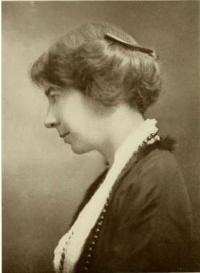
I Am Not Yours
I am not yours, not lost in you,
Not lost, although I long to be
Lost as a candle lit at noon,
Lost as a snowflake in the sea.
You love me, and I find you still
A spirit beautiful and bright,
Yet I am I, who long to be
Lost as a light is lost in light.
Oh plunge me deep in love, put out
My senses, leave me deaf and blind,
Swept by the tempest of your love,
A taper in a rushing wind.
Sara Teasdale
(1884-1933)
I Am Not Yours
• fleursdumal.nl magazine
More in: Archive S-T, Archive S-T, Teasdale, Sara

Sydney
In her grey majesty of ancient stone
She queens it proudly, though the sun’s caress
Her piteous cheeks, ravished of bloom, confess,
And her dark eyes his bridegroom glance have know.
Robed in her flowing parks, serene, alone,
She fronts the east; and with the tropic stress
Her smooth brow ripples into weariness;
Yet hers the sea for footstool, and for throne
A continent predestined. Round her trails
The turbid squalor of her streets, and dim
Into the dark heat-haze her domes flow up;
Her long lean fingers, with their grey-old nails,
Giving her thirsty lips to the cool brim
Of the bronze beauty of her harbour’s cup.
Arthur Adams
(1872-1936)
Sydney
• fleursdumal.nl magazine
More in: Adams, Arthur, Archive A-B, Archive A-B
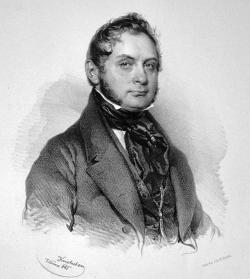
Venedig
Ich bin so krank und sterben möcht’ ich gerne
Hier in Venedig, und begraben liegen
In dieser Flut, dem Ruheplatz der Sterne!
In jeder Nacht pfleg’ ich mich drauf zu wiegen,
Und ihrer Tiefe schwärzeste Geschichten
Behorch’ ich dann mit schaurigem Vergnügen. –
Beschloß der Rat der Drei, geheim zu richten
Ein Opfer, des Geschrei’s im Volke wegen,
Und galt’s ein schnell und spurenlos Vernichten:
Da glitt um Mitternacht, dem Mond entgegen,
Die Gondel aus der Seufzerbrücke Schatten,
So schwarz und still, wie alle Gondeln pflegen.
Und lautlos durch Galeeren und Fregatten
Kroch sie hindurch, bis wo des Meeres Enge
Sich dehnt zu breiteren, smaragdnen Matten.
Dort hielt sie still. Dann aber war’s, als sprenge
Ein dumpfer Fall die kaum bewegte Fläche,
Und leise Kreise zitterten in Menge.
Auch war’s den Schiffern, die im Nachtgespräche
An Lido’s Ufern stellten ihre Stricke,
Als ob ein Schrei im Wellenschlag zerbräche.
Die stille Gondel aber schwamm zurücke,
Wie sie gekommen, spurlos und verborgen,
Und schwand im Schattenstreif der Seufzerbrücke:
Doch der Verbrecher starb am andern Morgen.
Moritz von Strachwitz
(1822 – 1847)
Venedig
Moritz Karl Wilhelm Graf von Strachwitz (1822-1847), deutscher Dichter
Lithographie von Josef Kriehuber, 1841
• fleursdumal.nl magazine
More in: # Classic Poetry Archive, Archive S-T, Archive S-T
Joris-Karl Huysmans (1848-1907) wordt door velen tot de fine fleur van de Franse letteren gerekend. Zelf omschreef hij zich vaak als een ‘Parijse Hollander’.
 Met het hoofd in Frankrijk, met het hart in Nederland en met de pen in een spagaat werkte deze auteur aan een uitzonderlijk oeuvre, doorspekt met verwijzingen naar – en reflecties op – de Nederlandse cultuur, volksaard, schilderkunst en religie.
Met het hoofd in Frankrijk, met het hart in Nederland en met de pen in een spagaat werkte deze auteur aan een uitzonderlijk oeuvre, doorspekt met verwijzingen naar – en reflecties op – de Nederlandse cultuur, volksaard, schilderkunst en religie.
Dit boek brengt deze Hollandse kant van Huysmans in kaart. Aan de hand van zijn biografie (Huysmans en Nederland), zijn kritische onthaal in de literaire journalistiek (Huysmans in Nederland) en zijn thematiek (Nederland in Huysmans), wordt een rijk en verrassend beeld gevormd van deze sleutelfiguur uit het Franse fin-de-siècle.
Huysmans omschreef zichzelf graag als een ‘Parijse Hollander’. Met zijn ene been in het artistieke leven van de Franse hoofdstad en met zijn andere in de Brabantse klei, werkte deze auteur aan een uitzonderlijk oeuvre doorspekt met verwijzingen naar – en reflecties op – de Nederlandse cultuur, volksaard, schilderkunst en religie. Dit boek brengt deze Hollandse kant van Huysmans in kaart. Aan de hand van zijn biografie, zijn kritische onthaal in de literaire journalistiek en zijn thematiek, wordt een rijk en verrassend beeld gevormd van deze sleutelfiguur uit het fin-de-siècle. Charles-Georges Huijsmans. Joris-Karl Huysmans. Met het hoofd in Frankrijk, met het hart in Nederland, met de pen in een spagaat.
# new books
Joris-Karl Huysmans (1848-1907)
Een Parijse Hollander
Auteur: Marc Smeets
Taal: Nederlands
ISBN: 9789087049256
NUR codes: 654 , 647
Jaar van uitgave: 2021
Druk 1
Uitgeverij Verloren
Bindwijze: paperback
Aantal bladzijdes: 226
Met illustraties
€20,00
• fleursdumal.nl magazine
More in: - Book News, - Bookstores, Archive G-H, Archive S-T, Histoire de France, Huysmans, J.-K., Huysmans, Joris-Karl, Joris-Karl Huysmans
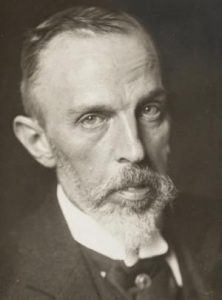
Dichterschap
Hij gaf verdwenen talen. Aan een school
in Rotterdam. Daaruit ontstond misschien
die diepe eenzaamheid die in hem school,
de angst dat iemand hem zou willen zien
om wie hij was, – om wie hij had te zijn,
een fluisteraar van oude stemmen zacht
die zich in peppels om de woning klein
verstopten voor de stiltes van de nacht.
Paul Bezembinder
Dichterschap
Gedicht
Foto: J.H. Leopold (1865 – 1925)
Paul Bezembinder studeerde theoretische natuurkunde in Nijmegen. In zijn poëzie zoekt hij vooral in klassieke versvormen en thema’s naar de balans tussen serieuze poëzie, pastiche en smartlap. Zijn gedichten en vertalingen (Russisch-Nederlands) verschenen in verschillende (online) literaire tijdschriften. Bundels: Kwatrijnen (Fantom E-books, 2018), Gedichten (2020, heruitgave), Parkzicht (2020). Meer voorbeelden van zijn werk vindt u op: www.paulbezembinder.nl.
• fleursdumal.nl magazine
More in: #Editors Choice Archiv, Archive A-B, Archive A-B, Bezembinder, Paul, Leopold, J.H.

The Eviction
In early morning twilight, raw and chill,
Damp vapours brooding on the barren hill,
Through miles of mire in steady grave array
Threescore well-arm’d police pursue their way;
Each tall and bearded man a rifle swings,
And under each greatcoat a bayonet clings:
The Sheriff on his sturdy cob astride
Talks with the chief, who marches by their side,
And, creeping on behind them, Paudeen Dhu
Pretends his needful duty much to rue.
Six big-boned labourers, clad in common freize,
Walk in the midst, the Sheriff’s staunch allies;
Six crowbar men, from distant county brought, –
Orange, and glorying in their work, ’tis thought,
But wrongly,- churls of Catholics are they,
And merely hired at half a crown a day.
The hamlet clustering on its hill is seen,
A score of petty homesteads, dark and mean;
Poor always, not despairing until now;
Long used, as well as poverty knows how,
With life’s oppressive trifles to contend.
This day will bring its history to an end.
Moveless and grim against the cottage walls
Lean a few silent men: but someone calls
Far off; and then a child ‘without a stitch’
Runs out of doors, flies back with piercing screech,
And soon from house to house is heard the cry
Of female sorrow, swelling loud and high,
Which makes the men blaspheme between their teeth.
Meanwhile, o’er fence and watery field beneath,
The little army moves through drizzling rain;
A ‘Crowbar’ leads the Sheriff’s nag; the lane
Is enter’d, and their plashing tramp draws near,
One instant, outcry holds its breath to hear
“Halt!” – at the doors they form in double line,
And ranks of polish’d rifles wetly shine.
The Sheriff’s painful duty must be done;
He begs for quiet-and the work’s begun.
The strong stand ready; now appear the rest,
Girl, matron, grandsire, baby on the breast,
And Rosy’s thin face on a pallet borne;
A motley concourse, feeble and forlorn.
One old man, tears upon his wrinkled cheek,
Stands trembling on a threshold, tries to speak,
But, in defect of any word for this,
Mutely upon the doorpost prints a kiss,
Then passes out for ever. Through the crowd
The children run bewilder’d, wailing loud;
Where needed most, the men combine their aid;
And, last of all, is Oona forth convey’d,
Reclined in her accustom’d strawen chair,
Her aged eyelids closed, her thick white hair
Escaping from her cap; she feels the chill,
Looks round and murmurs, then again is still.
Now bring the remnants of each household fire;
On the wet ground the hissing coals expire;
And Paudeen Dhu, with meekly dismal face,
Receives the full possession of the place.
William Allingham
(1824 – 1889)
The Eviction
• fleursdumal.nl magazine
More in: Allingham, William, Archive A-B, Archive A-B
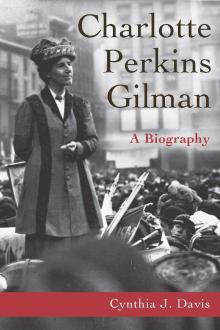
She who is to come
A woman–in so far as she beholdeth
Her one Beloved’s face;
A mother–with a great heart that enfoldeth
The children of the Race;
A body, free and strong, with that high beauty
That comes of perfect use, is built thereof;
A mind where Reason ruleth over Duty,
And Justice reigns with Love;
A self-poised, royal soul, brave, wise and tender,
No longer blind and dumb;
A Human Being, of an unknown splendor,
Is she who is to come!
Charlotte Perkins Gilman
(1860-1935)
She who is to come
Suffrage Songs and Verses
• fleursdumal.nl magazine
More in: # Classic Poetry Archive, Archive G-H, Archive G-H, Feminism
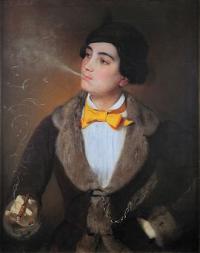
Dithyrambe
Glücklich, wem der Gott der Reben
Seine süßen Gaben beut,
Hüllend um das ganze Leben
Selige Vergessenheit!
Alle finstern Geister weichen,
Aller Fesseln sind wir los,
Herrscher in des Traumes Reichen,
Fühlt der Geist sich frei und groß.
Fort, mit deinen bleichen Zügen,
Träumende Erinnerung!
Deinen Zauber zu betrügen,
Fühl’ ich mächtig mich und jung!
Heiliger Entzückung Gluten
Fach’ ich in der Seele an;
Möchte frei das All’ umfluten,
Wie der alte Ocean!
Stürmt empor, ihr Jugendgeister!
Tanzt um mich in frohen Reih’n!
Immer frischer, immer dreister,
Stürzt ins Leben euch hinein!
Fluch den fremden, starren Mächten,
Die der Menschen Sinn betört;
Die uns martern, die uns knechten,
Die mein ganzes Sein zerstört!
Mächt’ger Gott der süßen Reben,
Spende mir Vergessenheit!
Schenke mir ein neues Leben,
Voll Genuß und Seligkeit!
Schlagt die Gläser all’ in Scherben:
So vergeh’ die alte Welt!
So mag sterben und verderben,
Was das Herz in Fesseln hält!
Louise Aston
(1814-1871)
Die wilde Rose
• fleursdumal.nl magazine
More in: # Classic Poetry Archive, Archive A-B, Archive A-B, Feminism
Thank you for reading Fleurs du Mal - magazine for art & literature